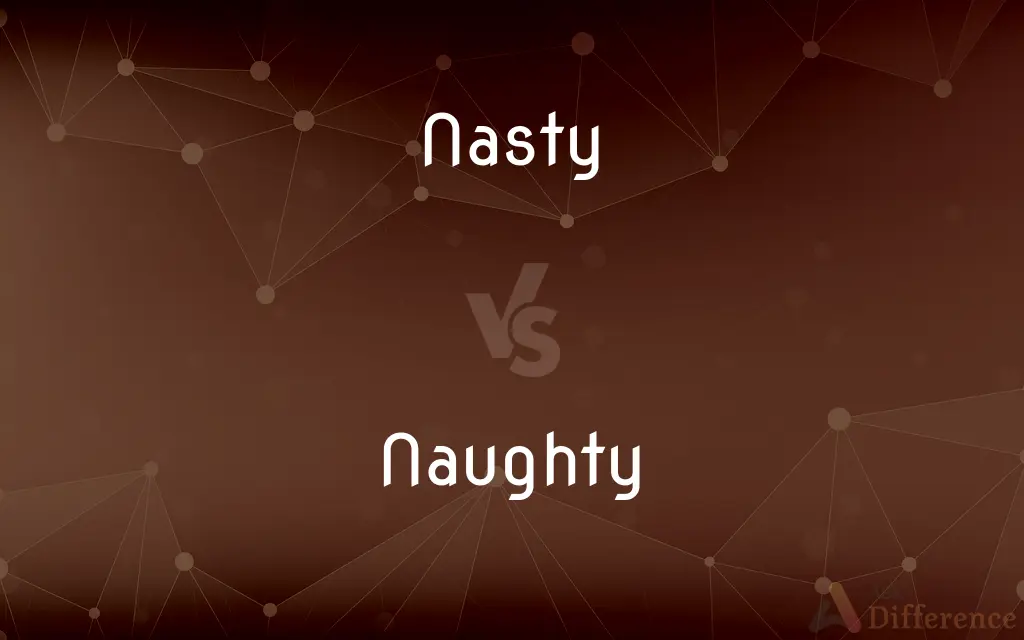Nasty vs. Naughty — What's the Difference?
By Tayyaba Rehman & Maham Liaqat — Updated on February 29, 2024
Nasty refers to something unpleasant or offensive, often relating to behavior or conditions, while naughty implies mischievous or mildly improper behavior, especially in a playful or teasing manner.

Difference Between Nasty and Naughty
Table of Contents
ADVERTISEMENT
Key Differences
Nasty is a term that connotes a severe degree of unpleasantness or offensiveness, whether in terms of physical conditions, behavior, or attitudes. It's used to describe things that are physically repugnant, such as filthy living conditions, or behavior that is morally reprehensible, such as mean-spirited actions. Naughty, on the other hand, historically related to naught (nothing), implies a lesser degree of misbehavior, often with a connotation of playfulness or lack of seriousness. It's typically used to describe children's behavior when they are acting out or not following rules, but with no malicious intent.
"Nasty" has a predominantly negative connotation, indicating something harmful or morally objectionable, "naughty" often carries a lighter, less serious tone. Naughty behavior is usually forgivable and not intended to cause real harm or offense. This distinction is important in social contexts, where the choice of word can significantly affect the perceived severity of the behavior being described.
The contexts in which these terms are used also differ; "nasty" can apply to a wide range of situations, including descriptions of taste, smell, personality traits, and environmental conditions. "Naughty," however, is more narrowly applied, often in relation to behavior that defies authority or societal norms in a non-threatening way.
Both terms have evolved, with "naughty" sometimes being used in contexts to suggest playful or mildly improper behavior, often with connotations. Despite this, its use remains predominantly light-hearted. "Nasty," however, has maintained its association with negativity and unpleasantness, making it a stronger term for expressing disapproval or disgust.
The cultural perception of these terms varies, with "naughty" sometimes seen as endearing or humorous when describing children's behavior, whereas "nasty" rarely has such positive interpretations. This reflects broader social attitudes towards different types of behavior and the language used to describe them.
ADVERTISEMENT
Comparison Chart
Connotation
Strongly negative, unpleasant.
Mildly negative, mischievous.
Typical Use
Describing repugnant conditions or morally reprehensible behavior.
Describing mischievous or mildly improper behavior, especially in children.
Severity
Indicates a higher degree of unpleasantness or offensiveness.
Suggests a lower degree of misbehavior, often playful.
Context
Broad, can refer to taste, smell, personality, and conditions.
More narrow, primarily related to behavior defying norms or authority.
Cultural Perception
Generally negative, with no positive implications.
Can be seen as endearing or humorous, especially in children.
Compare with Definitions
Nasty
Nasty describes something very unpleasant to the senses or feelings.
The nasty smell from the kitchen made her nauseous.
Naughty
Naughty behavior is generally seen as not malicious.
The students' naughty prank was harmless but disrupted the class.
Nasty
Nasty also denotes mean or malicious behavior.
The comments on the post were unnecessarily nasty.
Naughty
Naughty can describe actions slightly indecent or improper.
He gave a naughty wink that made her laugh.
Nasty
Nasty suggests a level of severity and harmfulness.
The dispute between the neighbors became quite nasty.
Naughty
Naughty implies mischievous or disobedient behavior without serious intent.
The child had a naughty grin after hiding the cookies.
Nasty
The term is used to express extreme disapproval.
The weather turned nasty, ruining the picnic.
Naughty
It is often used in a light-hearted manner to describe children's behavior.
Her daughter was being naughty by not going to bed on time.
Nasty
It can refer to vile or filthy conditions.
They found themselves in a nasty, dilapidated building.
Naughty
The term carries a connotation of playfulness.
The puppy's naughty antics amused everyone.
Nasty
Very bad or unpleasant
Plastic bags burn with a nasty, acrid smell
Dad's had a nasty accident
Naughty
(especially of a child) badly behaved; disobedient
You've been a really naughty boy
Nasty
Behaving in an unpleasant or spiteful way
Harry was a nasty, foul-mouthed old devil
Naughty
Behaving disobediently or mischievously
A naughty child.
Nasty
An unpleasant or harmful person or thing
A water conditioner to neutralize chlorine and other nasties
Naughty
Indecent; improper
A naughty wink.
Nasty
Thoroughly unpleasant;
Filthy (or foul or nasty or vile) weather we're having
Naughty
Badly behaved;
He was saucy and mischievous in school
A naughty boy
Common Curiosities
Is nasty ever used in a positive context?
Nasty is rarely used positively, as it denotes unpleasantness or offensiveness.
How does the severity of behavior affect the choice between nasty and naughty?
Behavior that is harmful or significantly offensive is more likely to be described as nasty, whereas minor misbehavior or mischief is termed as naughty.
What is the main difference between nasty and naughty?
Nasty refers to something highly unpleasant or offensive, while naughty denotes mischievous or mildly improper behavior.
How do cultural perceptions influence the use of nasty and naughty?
Cultural perceptions shape the acceptability and implications of these terms, with naughty sometimes viewed positively in playful contexts, whereas nasty maintains a negative connotation across cultures.
Are there any synonyms that can replace nasty or naughty without changing the meaning?
For nasty, synonyms include vile or repugnant; for naughty, mischievous or impish, though nuances may vary.
Is it appropriate to use naughty to describe serious misbehavior?
No, naughty is inappropriate for serious misbehavior; it's reserved for lighter, more playful forms of misbehavior.
Can the term naughty have negative implications?
While generally lighter and less severe, naughty can still carry negative implications, especially if the behavior is disruptive or disrespectful, but it's usually not seen as malicious.
How has the use of naughty evolved over time?
Naughty has evolved from implying wickedness or nothingness to mainly denoting playful misbehavior or mild impropriety, with its use broadening in contexts for playful or slightly improper behavior.
Why might someone choose to describe behavior as nasty?
Describing behavior as nasty indicates a strong disapproval and highlights the behavior's unpleasant or offensive nature.
What implications does calling a child naughty have?
Calling a child naughty typically implies mischievous but non-malicious behavior, suggesting a need for gentle correction rather than severe punishment.
Can the context change the interpretation of naughty and nasty?
Yes, context significantly affects the interpretation; naughty is often seen as endearing or humorous, especially with children, while nasty is almost universally negative.
Can the same action be described as both nasty and naughty?
It's unlikely, as the terms imply different levels of severity and intent; what's considered nasty is usually too severe to be deemed naughty.
How do societal norms affect the usage of these terms?
Societal norms dictate the acceptability and interpretation of these terms, influencing when and how they are used to describe behavior or conditions.
How does the intention behind behavior influence whether it's called nasty or naughty?
Intention is key; behavior with harmful intent or significant unpleasantness is nasty, while behavior with playful or minor misbehavior is naughty.
Share Your Discovery

Previous Comparison
Average vs. Normal
Next Comparison
Realism vs. ExistentialismAuthor Spotlight
Written by
Tayyaba RehmanTayyaba Rehman is a distinguished writer, currently serving as a primary contributor to askdifference.com. As a researcher in semantics and etymology, Tayyaba's passion for the complexity of languages and their distinctions has found a perfect home on the platform. Tayyaba delves into the intricacies of language, distinguishing between commonly confused words and phrases, thereby providing clarity for readers worldwide.
Co-written by
Maham Liaqat













































